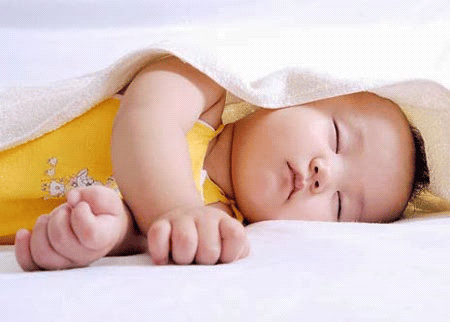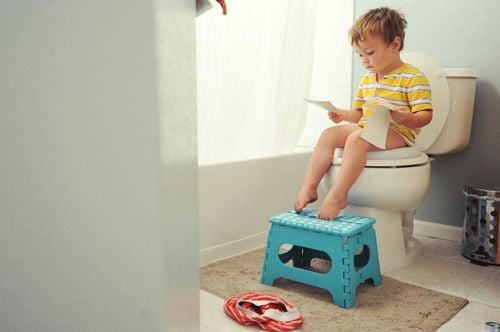Written by Dr. Dam Thi Quynh - Pediatrics Center - Vinmec Times City International General Hospital
Moro reflex (startle reflex): This reflex occurs when a baby is startled by a loud noise or sudden movement. In response to the sound, the baby may extend their arms and legs away from the body, cry, but then immediately bring their arms back in as if hugging themselves. Sometimes the baby's own cry can startle them and initiate this reflex. This reflex lasts until the baby is 5-6 months old.
1. When the startle reflex occurs, the baby will go through 2 stages
- Stage 1: The baby will experience a feeling of free-falling, so the first reaction will be to raise and straighten the arms, and may even gasp and start crying.
- Stage 2: The baby will curl their arms and legs close to the body, returning to a fetal position.
In fact, there is no way to prevent the startle reflex from occurring. If a newborn baby is startled in the first few months of life, parents can rest assured that the baby is completely healthy, and this reflex usually only occurs for a few short seconds but can also cause a lot of trouble because it can wake the baby from a good sleep and cause crying. Some babies may fall back asleep immediately after that, but some may not, causing parents to wake up with the baby as well.
2. So what causes babies to startle when they sleep?
There are two groups of causes: benign and pathological.
- Benign causes: This is a physiological reflex because it is not accustomed to the environment, noise, or being suddenly put down, and usually only occurs for a few seconds and then stops immediately. It is a physiological condition that parents should not worry too much about.
- Pathological causes: Including: Babies are sick (coughing, fever, cold, ...), gastroesophageal reflux disease, calcium deficiency, central nervous system damage, congenital heart disease,... are the causes that make babies sleep poorly and are easily startled. Parents should monitor to see how long the condition lasts and if they see any abnormalities, they need to see a specialist for advice.

3. How to help babies startle less and sleep better?
Noise is the main cause of babies being startled and frightened. Therefore, parents should let their babies sleep in a quiet environment, away from loudspeakers, TVs,... A cool, draft-free, and quiet environment helps babies sleep better and deeper. This is an ideal environment to help babies reduce nighttime startles.
- Feed your baby well before bed: When hungry, babies can wake up startled. Therefore, mothers should feed their babies well before bed. Breast milk is a great source of nutrition to help babies develop fully and have a good night's sleep every day.
- Keep the baby close to the mother: Many babies are startled because they are scared. Therefore, in the first few months, mothers should keep their babies close to them. Before the baby falls asleep, mothers should hold them for a while, and when the baby is asleep, mothers should slowly put them down on the bed. Note that you should not create for your baby a bad habit of putting their head on your hand when sleeping. When the baby is asleep, mothers should slowly put them down on the bed. By this way, the baby will not be startled and will not be dependent on the mother.
- Encourage physical activity: Gentle movements such as stretching the legs and arms increase flexibility, helping babies easily control their reflexes and reduce startles. Support your baby's movement by having them lie on their stomach and lift their head or have them lie in your lap to control their head and neck
- Keeping the light in the room dim is also a way to help babies reduce startles. Do not suddenly turn off or on bright lights when the baby is sleeping. Do not turn off the lights completely because mothers will not be able to monitor and detect any abnormalities in the baby while the baby is sleeping. But also do not leave the lights too bright. A soft, dim night light will help your baby feel more secure and also help mothers change diapers and care for their baby more easily at night.
Minimize other "startling" factors. In addition to the main factors that easily cause babies to startle when sleeping, there are other factors that mothers need to pay attention to. For example:
- Do not play with your child before bed to avoid stimulating your child's nerves.
- Always make sure your baby's diaper is changed promptly, clean, soft, and absorbent to enhance sleep.
- Your baby's clothes should be soft, comfortable, and provide maximum comfort.

Newborns may startle frequently due to calcium deficiency or conditions such as gastroesophageal reflux disease, central nervous system damage, congenital heart disease,... In these cases, parents should take their child to a specialist for diagnosis and treatment.
In some special cases, when mothers have done everything but the baby still starts frequently, accompanied by abnormal signs such as: Excessive crying, sweating, poor feeding,... mothers should take their baby to a specialist.
After treatment, children need to be supplemented with additional essential micronutrients such as: Zinc, Selenium, Chromium, Vitamins B1 and B6, ginger, acerola extract (vitamin C),... to help improve the immune system, enhance resistance and reduce minor illnesses.
Parents should regularly follow the website: Vinmec.com to update useful information on child care.
To arrange an appointment, please call HOTLINE or make your reservation directly HERE. You may also download the MyVinmec app to schedule appointments faster and manage your reservations more conveniently.









